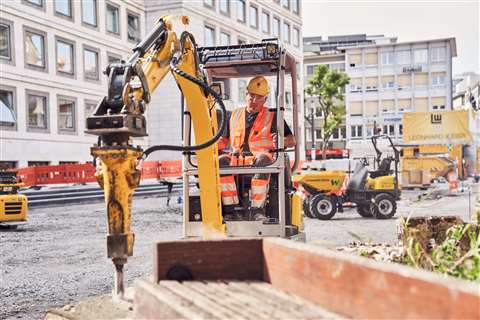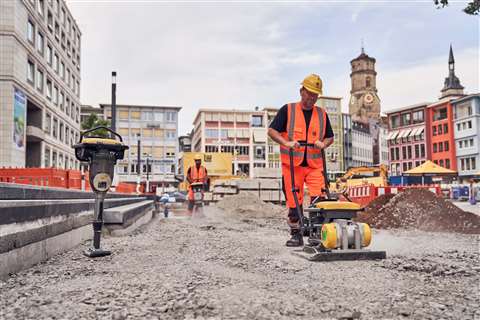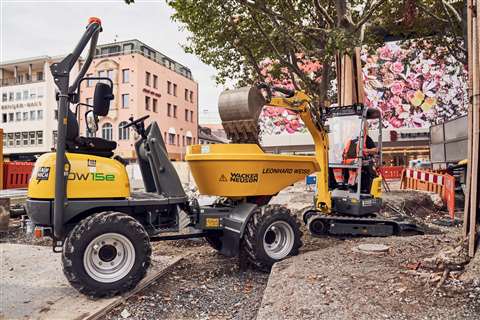Wacker Neuson’s electric equipment tested
03 February 2022
 Leonhard Weiss used the EZ17e Zero Tail excavator to carry out excavation and demolition tasks in Stuttgart, Germany. Photo: Wacker Neuson
Leonhard Weiss used the EZ17e Zero Tail excavator to carry out excavation and demolition tasks in Stuttgart, Germany. Photo: Wacker Neuson
Construction company Leonhard Weiss has put Wacker Neuson’s entire range of zero-emission machinery to use on a construction site in Germany, in what has been described as “practical test”.
The company, which has subsidiaries in nine other European countries, operates in a number of industry sectors including roadbuilding, railway construction, engineering and turnkey construction, and carries out restoration and preservation projects.
A long-standing partner of Wacker Neuson, Leonhard Weiss used the manufacturer’s electric and battery-powered equipment to carry out the renovation of the main market square in Stuttgart, in south-west Germany.
This included the DT10e track dumper, the DW15e wheel dumper, and the WL20e wheel loader, which were primarily used to transport material onsite.
 Photo: Wacker Neuson
Photo: Wacker Neuson
Alongside these, Leonhard Weiss also used the EZ17e Zero Tail excavator to carry out excavation and demolition tasks, and Wacker Neuson’s battery-powered rammers and its new APS series battery-powered plates for soil compaction.
Simon Schall, Head of Central Machine Technology at Leonhard Weiss, said, “We really like the fact that the electric machines and construction equipment have the same power as conventional ones.
“During daily operation, there are fewer maintenance points than with combustion-engine equipment, and drivers or operators can get to grips with the machine much more easily.”
According to Wacker Neuson, its zero-emissions range can help contractors meet the increasing stringent exhaust and noise emissions regulations.
 The DW15e wheel dumper on site in Stuttgart, Germany. Photo: Wacker Neuson
The DW15e wheel dumper on site in Stuttgart, Germany. Photo: Wacker Neuson
“The electrically powered construction machines are also up to 20 decibels quieter than their gasoline-powered counterparts,” the company said.
“This is an extreme reduction, as just ten decibels less means a 50% reduction in perceived loudness.”
STAY CONNECTED



Receive the information you need when you need it through our world-leading magazines, newsletters and daily briefings.
CONNECT WITH THE TEAM











